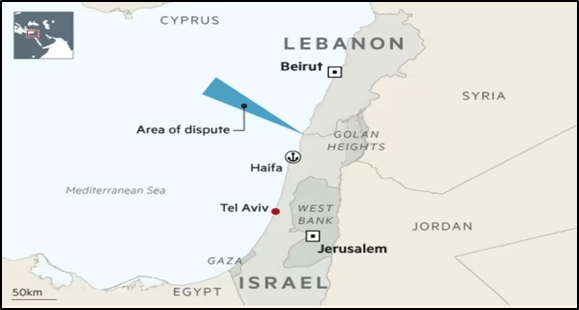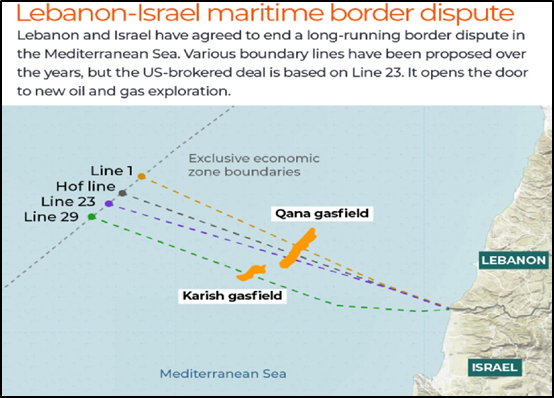In News:
- Israel has announced a historic deal with Lebanon, aimed at resolving a long-running maritime border dispute over Mediterranean waters.
- Israel and Lebanon do not have official diplomatic relations and the two countries remain technically at war.

What’s in Today’s Article:
News Summary
- Lebanon and Israel have reached a historic deal, brokered by USA, to end a long-running maritime border dispute in the gas-rich Mediterranean Sea.
- A signing date for the deal has not been set yet.
Maritime dispute between Israel and Lebanon
- The two countries declared overlapping boundaries in 2011 in the Mediterranean Sea.
- Since both countries have been technically at war, the United Nations was asked to mediate.
- The issue gained significance after Israel discovered two gas fields off its coast a decade ago, which experts had believed could help turn it into an energy exporter.
Key highlights of the agreement
- The draft agreement aims to settle Israel and Lebanon’s competing claims over offshore gas fields in the region.
- Sets maritime boundary
- The agreement sets a border between the maritime waters of Lebanon and Israel for the first time.
- Lebanon recognised Israel's existing control of a 3-mile-wide stretch of water closest to their shared coast.
- Israel allowed Lebanon the right to drill in a previously contested gas field that stretches between the Israeli and Lebanese economic zones.
- Division of gas fields
- A major source of friction was the Karish gas field, which Israel insisted fell entirely within its waters and was not a subject of negotiation.
- The agreement has not been made public but under terms leaked to the press all of the Karish field would fall under Israeli control.
- On the other hand, Lebanon will get its full rights from the Qana field, and Israel might receive share of future revenues.

Significance
- The agreement is also expected to avert the immediate threat of conflict between Israel and Hezbollah militants in Lebanon.
- The agreement will create new sources of energy and income for both countries, particularly important for Lebanon, which is facing a crippling energy and financial crises.
- It could also have a potentially wider impact: it would likely provide Europe with a potential new source of gas amid energy shortages caused by the Russian invasion of Ukraine.
Land border dispute not covered under the agreement
- The agreement does not touch on the shared land border between Israel and Lebanon.
- Land border between the two countries is still disputed. However, both countries have committed to a ceasefire.
- This border is also called the Blue Line, a boundary that was drawn up by the UN after Israel withdrew from southern Lebanon in 2000.
- This land border is currently patrolled by the United Nations forces.











